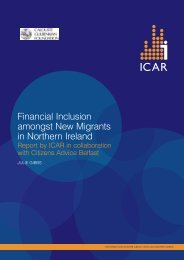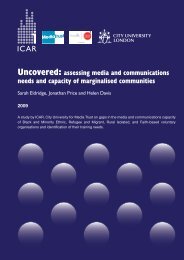The Somali community in the UK: What we know and how we ... - ICAR
The Somali community in the UK: What we know and how we ... - ICAR
The Somali community in the UK: What we know and how we ... - ICAR
Create successful ePaper yourself
Turn your PDF publications into a flip-book with our unique Google optimized e-Paper software.
from <strong>the</strong> <strong>UK</strong>, <strong>Somali</strong>s <strong>we</strong>re expelled, <strong>and</strong> women<br />
began to jo<strong>in</strong> <strong>the</strong>ir husb<strong>and</strong>s. In <strong>the</strong> early 1980s <strong>the</strong><br />
beg<strong>in</strong>n<strong>in</strong>gs of armed conflict <strong>in</strong> <strong>the</strong> north <strong>in</strong>itiated a<br />
trickle of refugees, but it was <strong>the</strong> beg<strong>in</strong>n<strong>in</strong>gs of allout<br />
civil war <strong>in</strong> 1988 that encouraged women such<br />
as Quadra to flee. <strong>The</strong> ensu<strong>in</strong>g chaos <strong>in</strong> <strong>the</strong> south<br />
after <strong>the</strong> overthrow of President Siad Barre <strong>in</strong> 1991<br />
provoked <strong>the</strong> major exodus, <strong>and</strong> <strong>the</strong> often tortuous<br />
<strong>and</strong> traumatic journey to <strong>the</strong> <strong>UK</strong>. Not all women<br />
came accompanied by men. Some <strong>we</strong>re wido<strong>we</strong>d,<br />
some left <strong>the</strong>ir husb<strong>and</strong>s fight<strong>in</strong>g, <strong>and</strong> so, dur<strong>in</strong>g <strong>the</strong><br />
late 1980s <strong>and</strong> <strong>the</strong> 1990s, <strong>the</strong> majority of <strong>Somali</strong>s<br />
reach<strong>in</strong>g Engl<strong>and</strong> <strong>we</strong>re s<strong>in</strong>gle mo<strong>the</strong>rs with <strong>the</strong>ir<br />
children. <strong>The</strong> latest phase of <strong>Somali</strong> immigration<br />
from third countries is also composed of relatives<br />
of those already here, some who orig<strong>in</strong>ally fled <strong>the</strong><br />
war, <strong>and</strong> some who <strong>we</strong>re born elsewhere.<br />
Generation <strong>and</strong> date of arrival crucially affect<br />
experience <strong>in</strong> <strong>the</strong> <strong>UK</strong>. As with all members of <strong>the</strong><br />
<strong>Somali</strong> <strong>community</strong>, generalisations about women<br />
must be read with <strong>the</strong> proviso that <strong>the</strong>y do not<br />
form a homogenous group. <strong>The</strong> teenagers <strong>in</strong><br />
<strong>the</strong> Break<strong>in</strong>g <strong>the</strong> silence team also testify to <strong>the</strong><br />
devastation of war, but do not share <strong>the</strong>ir elders’<br />
nostalgia for home: “<strong>The</strong>re are opportunities for<br />
me. I will stay here forever”; “I have a home <strong>and</strong><br />
friends. And I am happy now”; “…I like <strong>the</strong> o<strong>the</strong>r<br />
people here. I like it here”. 130<br />
But one critical difference, that of social class, may<br />
not be apparent to an external eye. Ruqia Hersi<br />
told <strong>the</strong> audience that:<br />
Most <strong>Somali</strong>an [sic] people want to go back.<br />
<strong>The</strong> only th<strong>in</strong>g stopp<strong>in</strong>g <strong>the</strong>m is <strong>the</strong> war.<br />
And here, <strong>the</strong>y feel like <strong>the</strong>y’re noth<strong>in</strong>g.<br />
<strong>The</strong> lo<strong>we</strong>st class. <strong>The</strong> bottom of society. 131<br />
Ruqia herself, besides be<strong>in</strong>g a mo<strong>the</strong>r, has a<br />
Master’s degree <strong>in</strong> chemical eng<strong>in</strong>eer<strong>in</strong>g. Educated<br />
<strong>and</strong> professional women face <strong>the</strong> same problem as<br />
<strong>the</strong>ir male counterparts - <strong>the</strong> difficulty of obta<strong>in</strong><strong>in</strong>g<br />
work commensurate to <strong>the</strong>ir qualifications. <strong>The</strong>y<br />
suffer <strong>the</strong> same loss not only of earn<strong>in</strong>g po<strong>we</strong>r, but<br />
also of status <strong>and</strong> self-esteem. Sales <strong>and</strong> Gregory<br />
(1998: 19) quote Fatima, who had been a nurse <strong>in</strong><br />
<strong>Somali</strong>a:<br />
My work was very important <strong>in</strong> my life. Now,<br />
when <strong>we</strong> go to a hospital here, <strong>the</strong>y th<strong>in</strong>k <strong>we</strong><br />
are noth<strong>in</strong>g, <strong>we</strong> don’t <strong>know</strong> anyth<strong>in</strong>g.<br />
Fatima embarked on a health promotion course,<br />
but, like men, professional women have difficulty<br />
<strong>in</strong> retra<strong>in</strong><strong>in</strong>g or convert<strong>in</strong>g <strong>the</strong>ir skills <strong>in</strong> order<br />
to equip <strong>the</strong>mselves to cont<strong>in</strong>ue <strong>the</strong>ir career.<br />
<strong>The</strong>re is also <strong>the</strong> problem of expense: if a wouldbe<br />
student does not yet have refugee status, she<br />
would be required to pay overseas students’ fees<br />
- way beyond most women’s pockets. Even with<br />
status, she must fulfil <strong>the</strong> three years’ residency<br />
requirement before be<strong>in</strong>g eligible for grants <strong>and</strong><br />
student loans on an equal foot<strong>in</strong>g with home<br />
students. As do men, women like Fatima often<br />
turn <strong>the</strong>ir energies to voluntary work with<strong>in</strong> <strong>the</strong><br />
<strong>community</strong>.<br />
Many women have arrived <strong>in</strong> <strong>the</strong> <strong>UK</strong> with no<br />
qualifications at all, but even those with skills have<br />
been prepared to undertake <strong>the</strong> k<strong>in</strong>d of menial<br />
work - clean<strong>in</strong>g or low paid work <strong>in</strong> service<br />
<strong>in</strong>dustries - that <strong>Somali</strong> men reject. But <strong>the</strong> feel<strong>in</strong>g<br />
of be<strong>in</strong>g at <strong>the</strong> bottom of society is not only<br />
generated by <strong>the</strong> workplace, but by experience <strong>in</strong><br />
society at large. After Ruqia’s contribution came an<br />
extract written by Ayan Farah:<br />
When I came to Europe, it was a cold period,<br />
Snow <strong>and</strong> ice everywhere,<br />
I was very cold….<br />
Two day [sic] after arriv<strong>in</strong>g I tried to go out….<br />
I had nowhere to go, no one to speak to.<br />
I took <strong>the</strong> bus to an address I knew<br />
I asked an elderly lady if she knew <strong>the</strong> place I<br />
was look<strong>in</strong>g for.<br />
She gave me a dirty look, <strong>and</strong> replied, ‘Don’t<br />
ask me, ask <strong>the</strong> bus driver. I’m scared of you!’<br />
<strong>The</strong> bus was full of people.<br />
An old man said, ‘Why have <strong>the</strong>se refugees<br />
come to our country?’<br />
I was embarrassed.<br />
Everyone was star<strong>in</strong>g at me, as if ‘refugee’ was<br />
written all over my face…. 132<br />
Racism is experienced by both women <strong>and</strong> men,<br />
but <strong>the</strong> feel<strong>in</strong>g of isolation with which this extract<br />
opens is high on <strong>the</strong> list of women’s problems,<br />
60 <strong>The</strong> <strong>Somali</strong> <strong>community</strong> <strong>in</strong> <strong>the</strong> <strong>UK</strong>

















